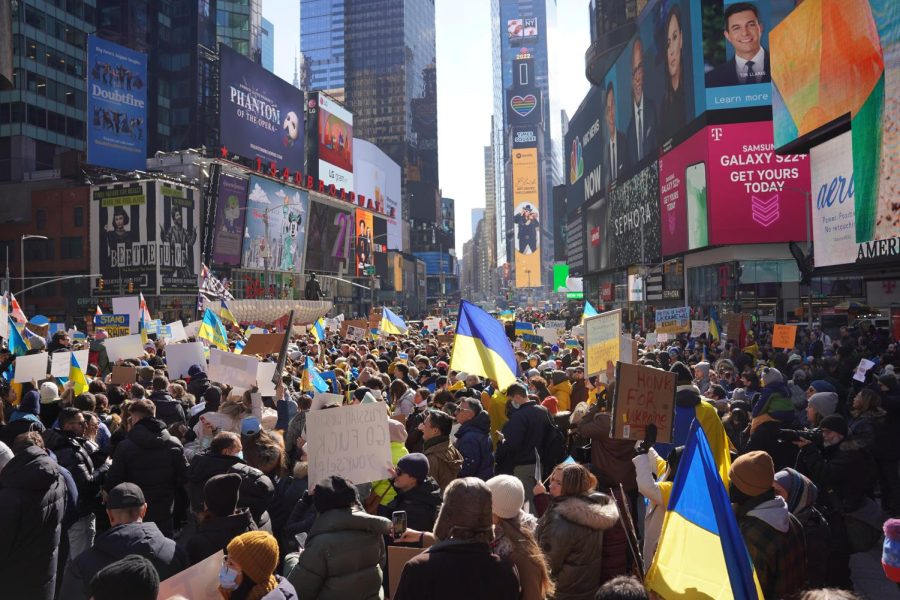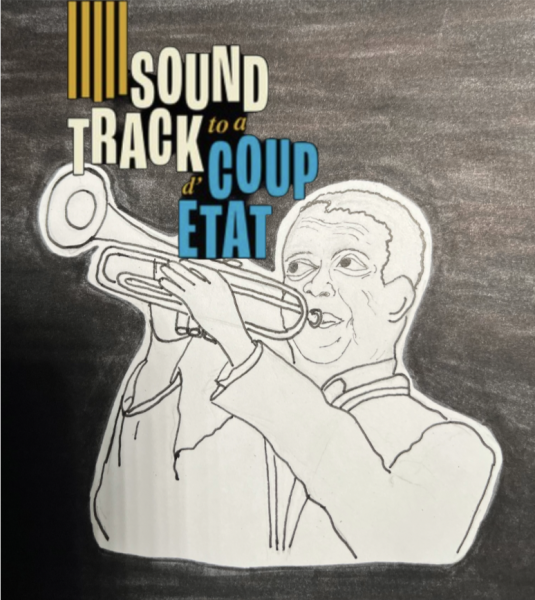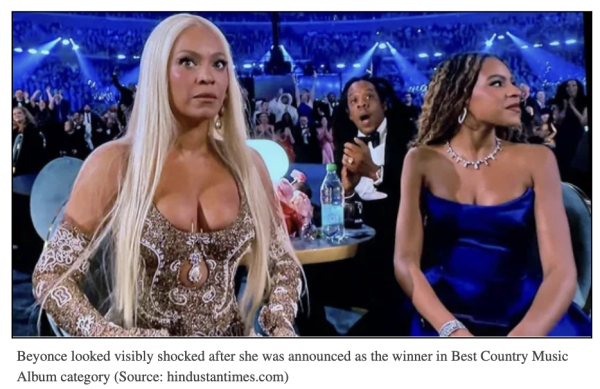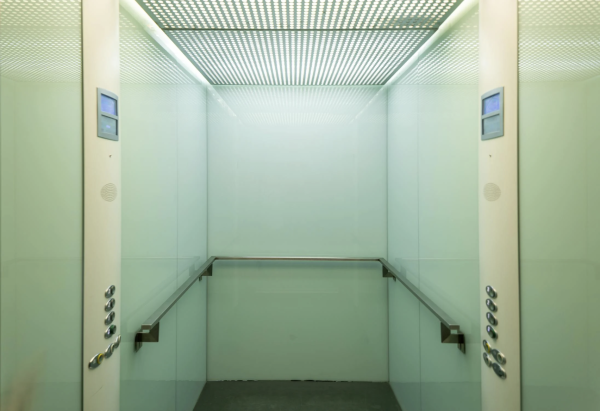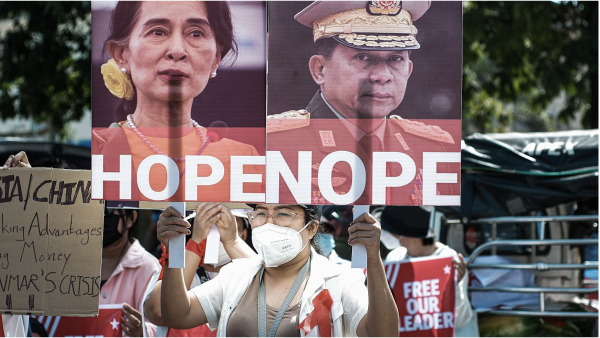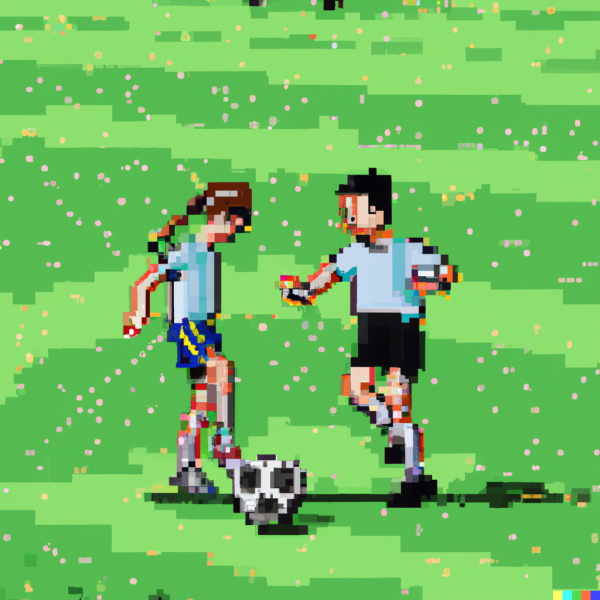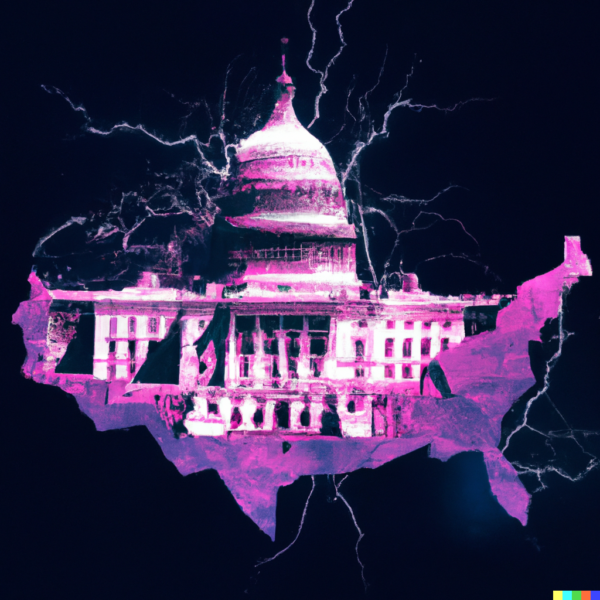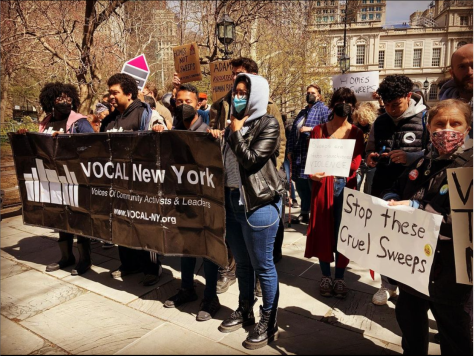The World Responds to the Invasion of Ukraine
Photo by Ethan Li
Thousands of people protest in support of Ukraine in Times Square, New York City on February 26, 2022.
On the early morning of February 24th, Russians found out that they were at war. After satellite imagery showed a military buildup on three sides of Ukraine over many months, Russian President Vladimir Putin announced a “special military operation” into Ukraine, with the aim to “demilitarize and denazify” it. He cited the demonstrably false claim of genocide being perpetrated by Kyiv and eastward NATO expansion as a pretext, even though foreign policy experts say the real motivation is most likely Ukraine’s growing freedom and democracy being interpreted as a threat to Putin’s rule.
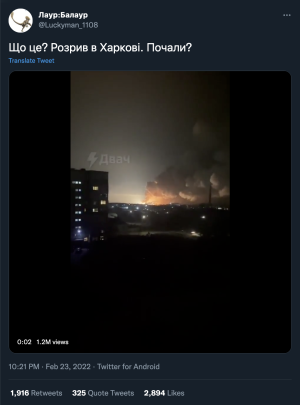
Minutes later, bombs started raining down all over Ukraine. At the same time, the United Nations Security Council was convening over the rapidly escalating crisis, with nation ambassadors calling for peace and de-escalation while the invasion had already begun. The Ukrainian Ambassador, Sergiy Kyslytsya, declared how his speech “became useless 48 minutes ago, because about 48 minutes ago your president declared war on Ukraine,” and called on the Russian chair to ‘give up his position and stop the war’. Kyslytsya ended the meeting by telling the Russian ambassador “There is no purgatory for war criminals. They go straight to hell.”
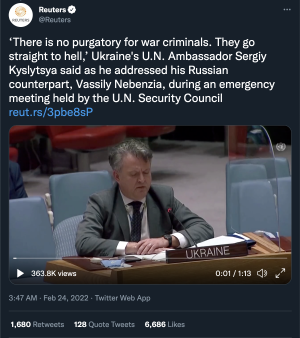
International condemnation was swift, and in the days following the beginning of the invasion sanctions targeting the Russian economy were imposed, such as the West preparing to cut off certain Russian banks from the SWIFT international payments system, and also perhaps more significantly, freezing the foreign assets of Russia’s central bank, reportedly worth $630 billion. In addition, sanctions targeting Putin himself as well as other Russian oligarchs have been established by numerous countries including the US. However, there have been concerns about the negative effect these measures could have on ordinary Russians, who have no say in Putin’s decision.
The conflict, compounded by these sanctions, has already had a profound effect on the Russian economy. For example, Russia’s largest banking and financial services company Sberbank lost 95% of its stock value last Wednesday after it announced that it had exited the European market due to “abnormal cash outflows.” As Russians scrambled to exchange money (which they can no longer do), the value of the Russian ruble crashed, plunging over 30% on February 28th, making it worth less than one US cent. For context, since the end of February, the ruble lost 60% of its value. It has not recovered since then.
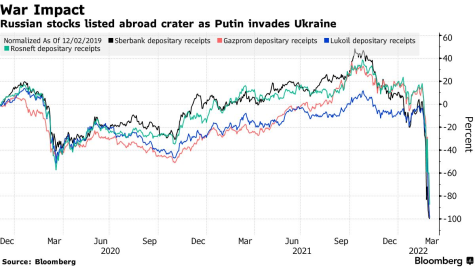
In an interview with UNISVerse, Millie Vizinberg-Honor, a T2 who is half Russian, offered her perspective on what effect Western sanctions would have. “I think that [sanctions] don’t really affect Putin that much,” she said, going on to remark that the sanctions would more likely affect the people of Russia. Videos shared on social media have already shown empty ATMs and long lines to withdraw money within Russia.
However, it’s not just economic sanctions that were imposed; the EU banned all Russian planes from entering its airspace on the 27th of February and the US followed suit a day later. The Russian carrier Aeroflot no longer flies internationally with the exception of Belarus. All these measures are aimed at isolating Russia on the world stage, but so far they have not seemed to deter Putin from continuing with his invasion.
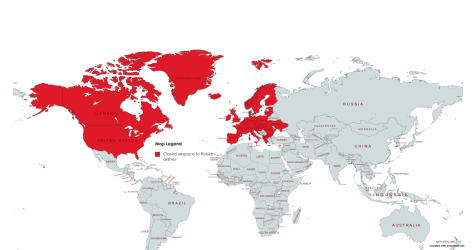
Meanwhile, EU member states and other Western allies have been supplying desperately needed military hardware to Ukraine, and perhaps most significantly, sending thousands of portable anti-tank and anti-aircraft weapons systems. Notably, Sweden’s historical adherence to political neutrality and Germany’s commitment to pacifism seems to have been challenged by Russia’s invasion. Even Switzerland, which famously remained neutral even during World War II, adopted sanctions against Russia. Moreover, in an unprecedented move, Poland announced on Tuesday that it would offer all of its MiG-29 fighter jets to the US in exchange for American jets, in a plan to send desperately needed Soviet-era planes to Ukraine. This effort to bolster Ukraine’s air force could affect the outcome of the war, experts say.
It’s not just the governments of the world that are taking action: the people are as well.
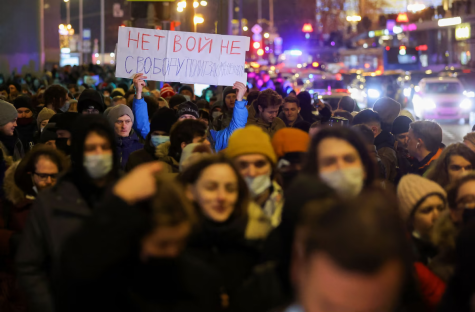
Across the world, from Moscow to New York, people are protesting in support of Ukraine. On the very same day of the invasion, thousands of protesters congregated all across Russia, chanting “Нет войне!” (“no to war”) making their voices heard and sending the message that the people of Russia do not support Putin’s decision to invade.
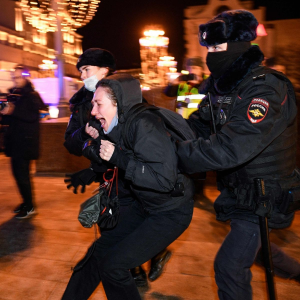
Security forces immediately cracked down, deploying riot police with batons and shields to suppress the protests. Human rights groups stated that riot police had used excessive force, with videos showing peaceful protestors being beaten and kicked. Thousands of people (journalists among them) were arrested, and as of the 6th of March, over 13,000 protestors have been detained since the start of the war according to OVD-Info, an independent Russian human rights organization. In fact, so many people have been arrested that the Russian authorities ran out of space in detention centers in Moscow and St. Petersburg. Last Wednesday it was reported that children had been detained by police as well.
“Every Russian I know, they stand with Ukraine and definitely oppose what Putin is doing because it affects both Russian people and Ukrainian people,” Millie commented, adding that many people— including her— have relatives and friends in Ukraine. “Just because they live in a different country doesn’t mean that they’re any less of an equal.”
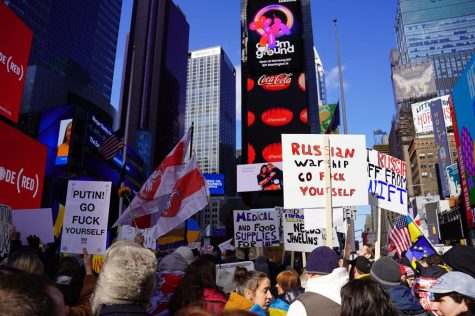
On the other side of the Atlantic in New York City, the home of the largest Ukrainian population in the United States, a protest was held in Times Square on February 26th with thousands of New Yorkers showing their support. Protestors cloaked in Ukrainian flags voiced their demands, chanting “Slava Ukraini!” (“Glory to Ukraine”) and “Hands off Ukraine!” Some carried handwritten signs quoting the Ukrainian president Volodymyr Zelenskyy, while others wrote “Russian warship, go [expletive] yourself!” quoting the defiant words of Ukrainian soldiers on Snake Island after being faced with either surrender or bombardment by Russian sailors.
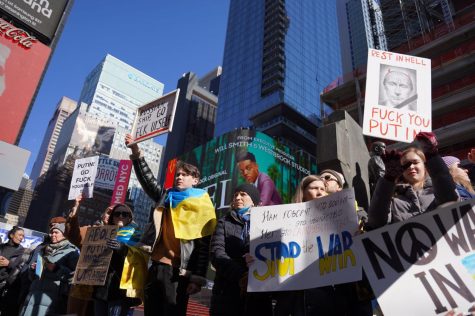
Many Ukrainians who attended the rally still have family and friends in Ukraine, with one protestor telling Abc7 how her mother is still in Kharkiv (which is currently being bombarded by Russian forces), and another tearfully showing a picture of her family who is stuck in Ukraine.
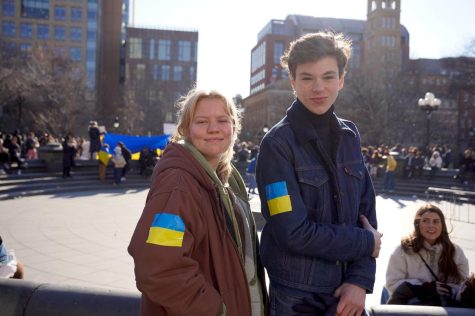
Ukrainians and non-Ukrainians alike stood side by side in solidarity, from Latvians to Belarusians, Georgians, and Russians. In an interview with AMNY, a Russian protestor named Aliya Passova said, “As a Russian we don’t want war. Only Putin does. The man is filled with greed.”
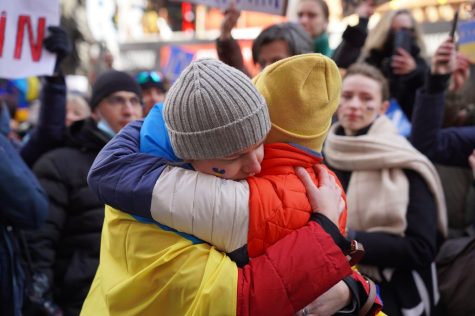
Protests in support of Ukraine continued throughout the week in New York City, with another one being held in Washington Square Park on February 27th. Among the protestors were UNIS students, with Alva Lyth Brand of T2 and Paul Vos of T1 showing their support.
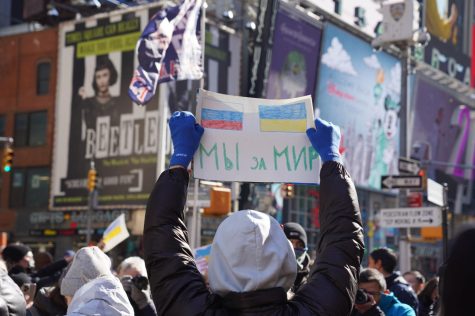
In an interview with UNISVerse, Alva said that as soon as she heard about the protest, she went without question. Having spent many years living in Ukraine, and having numerous friends fleeing or still stuck there, she explained that since the start of the invasion, she hadn’t “gone more than a minute without thinking about it.”
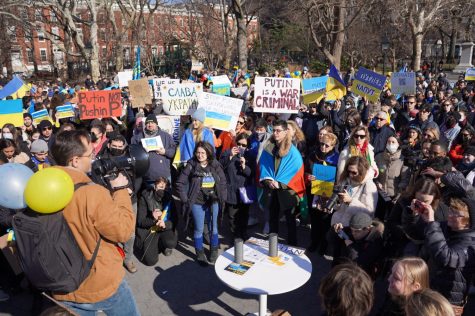
T2 student Anna Schubert, who was born in Kyiv, said she was saddened “to see […] not only where I was born [be destroyed], but also to see where my parents used to live, […] and it just it was really shocking.”
When asked whether they thought Ukraine would prevail, their response was immediate. “100 percent,” they said simultaneously. “I don’t think they [Russia] understand that it’s not really an option for Ukrainians to surrender,” Anna added, citing the 2014 Euromaidan protests and subsequent ousting of the former pro-Russia President, Viktor Yanukovych as a clear example of Ukrainian resistance and resilience. Alva agreed, saying “that’s again why so many of us kind of already knew that they weren’t going to give up without a fight, because we’ve seen it before, and […] just that they’re incredibly tough and everything and I- I just I love that.”
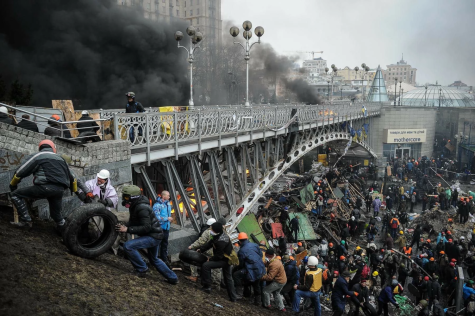
In response to a question about what’s happening on the ground in Ukraine, Anna said that despite many of her father’s colleagues being offered refuge and safety by their friends in Germany, “they all want to fight for their families and for their national identity.”
Even in such a grim situation, the defiance of Ukrainians is unwavering. From President Zelenskyy’s impassioned speeches, inspiring and invigorating the Ukrainian people, the moving videos of civilians blocking Russian convoys with their bodies, to the numerous comedic incidents of Ukrainian civilians and farmers making off with millions of dollars worth of abandoned Russian military equipment, morale has never been higher. In fact, according to a poll conducted by the Rating group, 88% of Ukrainians believe they can successfully win the war against Russia, a testament to the confidence of the populace.
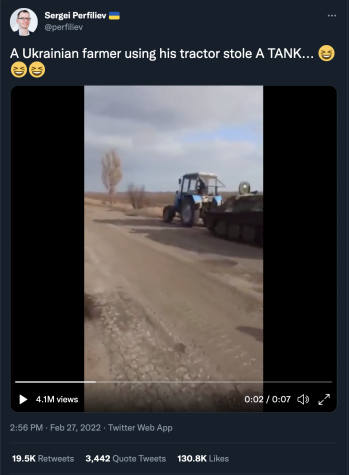
Back at UNIS, the response to the invasion seemed to be mixed.
In response to the war, UNIS Executive Director Dan Brenner put out a statement on February 28th, writing “UNIS as an institution, embodies the UN principles that believe conflicts should be settled at the peace table and not on battlefields. We advocate ways to eradicate aggression and violence, not embrace it.”
The response from the students, on the other hand, seems to be more tepid. When asked if UNIS students care enough about this crisis, Alva’s response was “No, but I don’t blame them.” She elaborated, saying that from her perspective it feels very personal, but for other students “It’s something that’s happening on the other side of the world that they feel very disconnected from, so instead of like feeling this very natural feeling towards it, you kind of have to try to be empathetic about it.”
Some students have expressed being helpless in not being able to influence such a faraway and complex conflict, and Alva said how she felt that the physical and emotional disconnect from UNIS naturally leads to indifference among students. She added that “A lot of the time, they [the students] don’t realize how safe they are, and they also don’t realize like how lucky they are to have a democracy that is you know- that is relatively stable.”
Millie also expressed concerns about some students oversimplifying the conflict which could affect Russians at UNIS, saying “I think that some people are seeing it [the conflict] with a generalization and are saying ‘All Russians support Putin’s decision’ and I feel like that might slightly be affecting our Russian community at UNIS, because they’re like ‘Oh, like why did you start this war? Tell Putin to stop this war,’ and it’s not our decision and no one supports Putin, we all want peace, [but] it’s not our choice.”
However, some students are getting involved in helping Ukraine, with Millie saying that the Russian department is about to start a fundraising campaign and send money to those in need.
Alva concluded by saying: “Despite the invasion leaving an indelible mark on what it means to be Ukrainian, Putin’s decision to try to erase Ukraine and its culture has only emboldened Ukrainians and made them even more proud of their national identity.”



